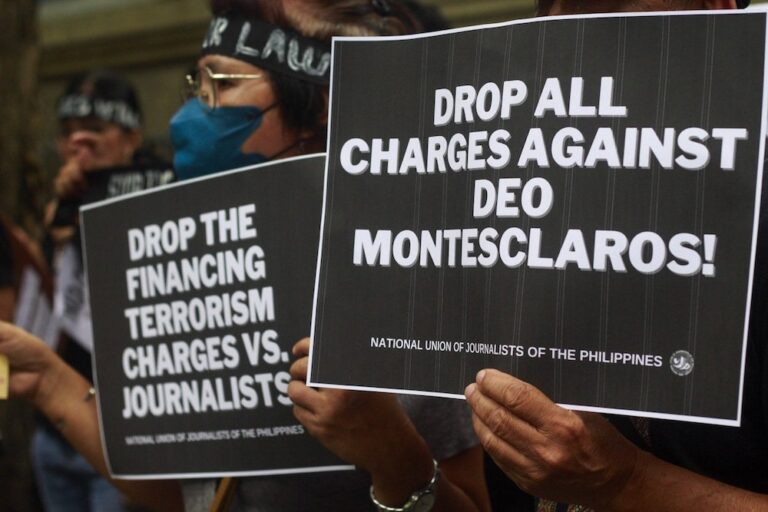RSF interviewed Prima Jesusa Quinsayas, a lawyer who has been hired by the FFFJ to represent the families of journalists murdered in Maguindanao.
(RSF/IFEX) – 31 August 2010 – The trial of those charged with the Maguindanao massacre, in which 32 media professionals were killed, is due to resume in Quezon City, near Manila, on 1 September, after a preliminary round of hearings ended on 17 August. At least 700 people, including 196 defendants, 200 prosecution witnesses and 300 defence witnesses will testify. Given the scale of the case, prosecutors think the trial will last several years.
The leading defendant is the former mayor of Datu Unsay, Andal Ampatuan Jr., who is charged with 57 murders. Other members of his clan are awaiting a ruling on the request they submitted to the justice ministry for a revision of the proceedings initiated against them.
This trial is a major test for the rule of law and the fight against impunity in the Philippines.
Reporters Without Borders urges the authorities to:
– provide sufficient material and human resources so that the main trial can be completed within a reasonable period;
– increase the justice ministry’s budgetary allocation for the protection of this case’s witnesses and their families.
In order to better understand what is at stake in this trial, Reporters Without Borders interviewed Prima Jesusa Quinsayas, a lawyer who has been hired by the Freedom Fund for Filipino Journalists (FFFJ) to represent the families of 17 of the journalists murdered in Maguindanao.
The trial will resume very soon. What is the strategy of the defendants and their 17 lawyers?
Three dates have been set for the prosecution to start presenting its evidence – 1, 8 and 15 September. From a TV interview given by defence lawyer Philip Pantojan in January 2010 and the various pleadings and motions filed by defence lawyers, it would seem that their strategy is to shift the blame on to other people, particularly Datu Rasul Sangki, the vice mayor of Ampatuan, who was a prosecution witness in the bail proceedings.
They are also trying to delay proceedings and muddle the issues by filing many recusations and ancillary motions – eight motions to inhibit have been filed so far – and by initiating other actions before other courts or quasi-judicial bodies, for example the petitions for certiorari [review by a higher court] that were separately filed by members of the Ampatuan family before the court of appeals.
Aside from the main case, which is the consolidated 57 counts of murder for the massacre, more than 20 other cases have arisen in relation to the main case, including arson, frustrated murder, murder, malversation, illegal possession of firearms, libel and so on. One of the problems we are now facing is that, because of the number of related cases, the prosecution team is short of logistical support. Incidentally, the relatives of the media victims have received consistent support from various media groups and alliances, but the relatives of the six passers-by who were among the victims have been largely overlooked.
What are the requests of the families of the victims you are representing?
The 17 families of media victims who are receiving FFFJ legal assistance are asking the prosecution to concentrate its efforts on securing the conviction of the main Ampatuan family defendants and not be distracted by peripheral issues.
What is the situation of the witnesses? Are death threats still going on?
Given the large number of prosecution witnesses – a total of 228 – it is inevitable that some of them have been exposed to threats. These have included:
– Cases of harassment, such as the libel complaint filed against witness Lakmodin Saliao by defence lawyer Philip Pantojan.
– Trumped-up charges, such as the murder cases filed against the witness Mohamad Sangki.
– Destruction and damage to property belonging to the Sangki family.
– Threats to harm the family of Badawi Bakal, former police chief of the Ampatuan town.
– Attempts to bribe witnesses, such as Kenny Dalandag, to change their testimony.
– The murder of Mohammad Isa Sangki, the youngest brother of Mohamad Sangki, and the attempted murder of Ibrahim Ebus, the brother of police officer Rainer Ebus, another of the witnesses.


